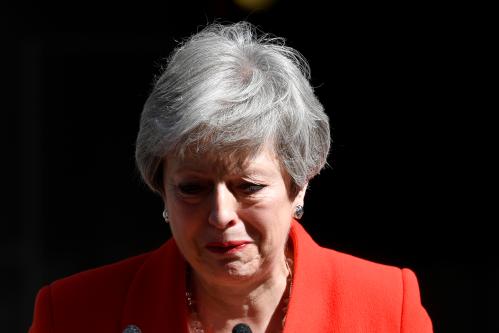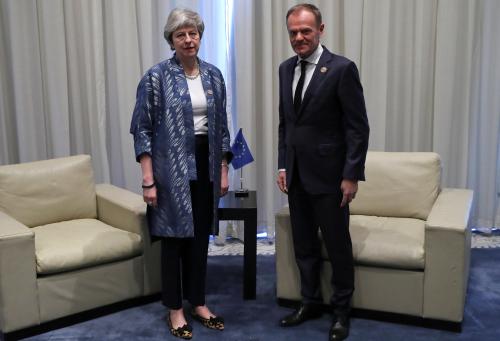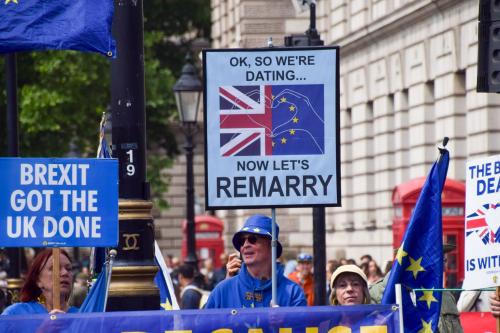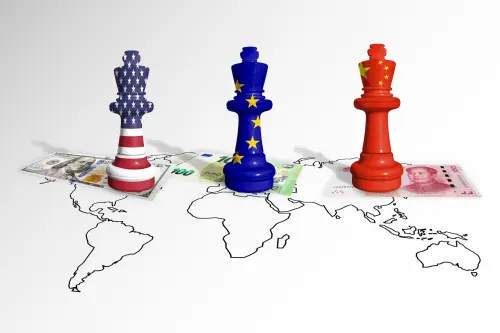President Trump has repeatedly interfered in the United Kingdom’s domestic politics, undercut its national security, and bullied its prime minister, argues Thomas Wright. This piece originally appeared in The Atlantic, ahead of President Trump’s state visit to the U.K.
President Donald Trump’s barbs at Germany and the European Union get the headlines, but no ally has been more tormented by him than the United Kingdom, to which he will make a state visit next week.
Over the past two and a half years, the president has interfered in the U.K.’s domestic politics. He has repeatedly undermined its national security with his comments and actions after terrorist attacks in Britain. He has bullied and humiliated the prime minister, Theresa May. He has accused British intelligence agencies of spying on him, even after he promised not to do so. Trump has taken a predatory approach in trade talks, seeking to squeeze controversial concessions out of London at a moment of weakness, even at the risk of sabotaging the prime minister’s Brexit deal. He refused to listen to the British government on vital issues of shared concern, like Iran and climate change.
The special relationship is arguably at its lowest point since the Suez Crisis of 1956, when President Eisenhower pulled the rug out from underneath Britain and France’s attempt to retake the Suez Canal. If this sounds like an exaggeration, just consider the track record.
On November 22, 2016, shortly after his election as president, Trump met with Nigel Farage in Trump tower and tweeted:
Many people would like to see @Nigel_Farage represent Great Britain as their Ambassador to the United States. He would do a great job!
— Donald J. Trump (@realDonaldTrump) November 22, 2016
The meeting caused consternation in London with Downing Street saying “there is no vacancy.”
On January 26, 2017, May visited Trump in the White House and offered him a state visit to the U.K. While she was on her way home, Trump signed the ban on citizens from seven countries from traveling to the United States, including on those citizens who were dual nationals of the U.K. Trump did not tell May of his plans, and mass protests quickly followed in London against the ban and Trump’s visit. May called the policy “divisive and wrong.”
On March 17 2017, the Trump administration claimed that the British intelligence services eavesdropped on Trump at the request of President Obama. A spokesperson for the prime minister said “We’ve made clear to the administration that these claims are ridiculous and should be ignored. We’ve received assurances these allegations won’t be repeated.” Trump would break that promise.
On May 23 2017, after British intelligence shared with their American colleagues the name of Salman Abedi, the man who bombed the Ariana Grande concert in Manchester, and photographs of the bomb remnants, those details were leaked to the press. The prime minister complained to the president and called the leaks unacceptable. The National Police Chiefs’ Council said that the “unauthorized disclosure of potential evidence … undermines our investigations.”
On June 3, 2017, three terrorists wielding knives killed seven people and injured dozens more. Trump tweeted “At least 7 dead and 48 wounded in terror attack and Mayor of London says there is ‘no reason to be alarmed!’” misconstruing the words of Sadiq Khan who said he was appalled and furious about the attacks but went on to say Londoners should not worry if they encountered more police on the streets.
On September 15, 2017, Trump tweeted during an ongoing terrorist attack on the London underground to justify his migrant ban and to claim without any evidence that the British authorities had the suspect “in their sights” beforehand.
In November 2017, Trump retweeted a video from the deputy leader of Britain First, a far-right group, that claimed to show a Muslim attacking a boy with crutches. The video was not what it purported to be, and the prime minister’s spokesperson issued a rare criticism of the president. Sajid Javid, now home secretary and a candidate to replace Theresa May, tweeted, “POTUS has endorsed the views of a vile, hate-filled racist organization that hates me and people like me. He is wrong and I refuse to let it go and say nothing.”
On a visit to the U.K. in July 2018, Trump gave an interview to The Sun in which he said the prime minister had ignored his advice for dealing with Brexit and her deal would kill the prospect of a free trade agreement with the United States. Trump also told the newspaper “I think you are losing your culture.” The story broke as Trump and May walked into a formal dinner.
On December 31, 2018, Woody Johnson, the U.S. ambassador to the U.K., said that a U.S.-U.K. free trade deal was unlikely if Theresa May succeeded in passing her Brexit deal. He was also withering about May personally, telling BBC Radio 4 “I’ve been all over Wales, I’ve been all over Ireland and Scotland and also England—and I am feeling that the country is in need of leadership.”
In a speech in London in April 2019, Mike Pompeo, the U.S. Secretary of State, directly criticized the prime minister by comparing her unfavorably with Margaret Thatcher. Pompeo said “Now is the exact opposite time to go wobbly. Ask yourself this: Would the Iron Lady be silent when China violates the sovereignty of nations through corruption or coercion? Would she allow China to control the internet of the future? I know it’s a sensitive topic, but we have to talk about sensitive things, as friends.” It was an extraordinary criticism to level in public, coming a month before Trump’s state visit.
On April 24, 2019, just a day after the British government confirmed the president’s State visit to the U.K., Trump tweeted:
“Former CIA analyst Larry Johnson accuses United Kingdom Intelligence of helping Obama Administration Spy on the 2016 Trump Presidential Campaign.” @OANN WOW! It is now just a question of time before the truth comes out, and when it does, it will be a beauty!
— Donald J. Trump (@realDonaldTrump) April 24, 2019
This broke the promise he made to May just over two years prior. A spokesperson for GCHQ, Britain’s equivalent of the National Security Agency, said in response “As we have previously stated, the allegations that GCHQ was asked to conduct ‘wire tapping’ against the then-president elect are nonsense. They are utterly ridiculous and should be ignored,”
And then there is the policy.
John Bolton has been in regular contact with leading Brexiteers, even as they warred with the prime minister over the nature of Brexit. White House sources told Axios that Bolton “encouraged the Brexiteers to keep it up.”
Secretary of Commerce Wilbur Ross and U.S. Trade Representative Robert Lighthizer have made it clear that the U.K., if it wants a free trade deal, will have to choose America’s regulatory framework over the European one, putting the U.K. in a position of being unable to conclude a trade deal with the EU 27, its largest trading partner. Such a deal would include provisions on chicken and access to the National Health Service that would almost certainly not make it through the House of Commons.
The Trump administration castigated the British in public for their reluctance to sever ties with the Chinese technology firm Huawei, but was very slow to present evidence that Huawei posed a security risk and to work with the British on the problem. Even those modest efforts failed spectacularly when the May government said it would move ahead with granting Huawei access to parts of the U.K. telecom network. The Brexiteers, supposedly Trump’s allies, look set to continue this policy if one of them succeeds May. For instance, Dominic Rabb, a leadership contender and the former Brexit secretary, told the BBC he would abide by May’s decision.
The British also feel as if they have gotten nothing from the Trump administration on their key foreign-policy priorities, including climate change and Iran. Privately, British diplomats vent their frustration at the administration. Publicly, they have no interest in acknowledging there is a problem solely because they have so many other problems to deal with.
The U.K. and the U.S. still have deep networks of cooperation on security and intelligence, but the lamentable state of the relationship under Trump will have lasting consequences. A no deal Brexit, which the United States is working toward, would badly damage Britain. The administration’s failed diplomacy on Huawei dramatically increases the China challenge in Europe. Trump’s constant interference, insults, and needling of senior British officials, including May, weakens the case for the alliance within Britain and could empower Jeremy Corbyn, the U.K.’s opposition leader and a longstanding critic of the United States.
The United States needs the U.K. It will have to do more than to keep the bust of Winston Churchill in the Oval Office. To preserve the alliance, it needs a very different approach. It should work with the U.K. on a trade deal that is compatible with the closest possible relationship with the EU 27 and preserves the Good Friday Agreement on Northern Ireland. It should devise trilateral structures to preserve security cooperation across the Atlantic. It should open a strategic dialogue with the U.K. on China and listen to Britain on Iran and climate change.
None of this will to happen in the foreseeable future. Instead, the situation is likely to go from bad to worse next week.
The Brookings Institution is committed to quality, independence, and impact.
We are supported by a diverse array of funders. In line with our values and policies, each Brookings publication represents the sole views of its author(s).








Commentary
How Trump undermined Theresa May
June 1, 2019